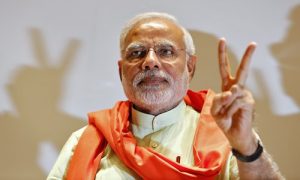Indian Prime Minister Narendra Modi has won a massive victory in the 2019 general election. Where will China-India and US-India ties head in his second five-year term?
China-India ties are likely to be stable in the future. At the Wuhan meeting between President Xi Jinping and Modi, the two sides agreed to promote all-round cooperation and manage and control their differences.
During Modi’s first term, China-India relations saw ups and downs. Both sides finally acknowledged that maintaining stable bilateral ties is in line with their interests.
Both China and India are emerging economies and the onus of development is huge. Economic development and improving people’s lives will remain Modi’s biggest challenge in his second term. Beijing’s top priority is development as well. In the future, both nations will continue their cooperation in development.
In spite of ups and downs in political ties, the two countries have had strong economic relations, as shown in frequent bilateral interaction on the economic front. For example, in 2018, Chinese brands accounted for more than 50 percent of smart phone sales in India. The Chinese mobile devices are made to high standards but are inexpensive. Chinese handset makers such as Xiaomi have set up factories in India, offering plenty of job opportunities to the country.
India holds great expectations from the Chinese market. Amid escalating trade conflicts between Beijing and Washington, New Delhi has realized that there are opportunities galore. India will seek greater access to the Chinese market for selling its agriculture products and pharmaceuticals.
Washington plays a role in Beijing-New Delhi ties. During Modi’s second term, India and the US may be divided in many spheres, but will maintain security cooperation.
In 2016, the US named India as a “Major Defense Partner.” In 2017, US President Donald Trump unveiled the new South Asia strategy and emphasized deepening US’ strategic partnership with India and backed India’s leading role in the Indo-Pacific region. During these two years, India got closer to the US and moved away from China. However, US-India ties have run into problems. New Delhi realized Trump administration’s policies toward India are not consistent. Washington’s moves in the future may go against New Delhi’s interests.
Trump administration’s determination in 2018 to withdraw around 7,000 US military troops from Afghanistan may embolden the Taliban and tighten the militia’s grip on Afghanistan, thereby affecting India’s security.
Trump administration’s Iran policy has also hurt India, which is the third largest oil importer, behind the US and China. Tehran has been New Delhi’s important oil supplier. Since the US stepped up sanctions on Iran, India’s oil import has been hit.
The US’ proclivity for unilateralism and protectionism would be an impediment to India’s development. The US is using the trade deficit with China as a pretext to launch a trade war with Beijing. Besides China, The trade conflict between Washington and New Delhi has emerged and India’ trade surplus with the US was $24.2 billion in 2018. India is worried about being the US’ next target.
There is a big development gap between the two states. Although India’s growth rate is high, its GDP per capita is still low. Its economic interests are very different from that of Washington.
In terms of security, India and the US still have common interests, as under the framework of “Indo-Pacific strategy,” Washington has tried to include India in its geopolitical strategy, giving a fillip to its significance in the region. The two sides have seen progress in military cooperation. In the future, their security communication and cooperation will continue.
In Modi’s second term, India will pursue a hedging strategy of carefully balancing ties with two giants. New Delhi will cooperate with the US in security, while coordinating with China in development and some hot issues such as multilateralism.
The author is professor of the Institute of International Relations at Tsinghua University, and director of Center for South Asian Studies. opinion@globaltimes.com.cn


